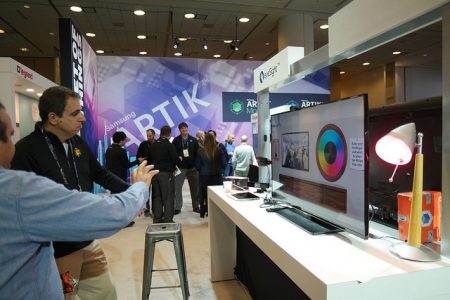South Korean tech giant has started offering a stable 1.0 release of its lightweight JavaScript engine designed for the Internet of Things (IoT).
Called JerryScript, the engine was developed to run on resource constrained devices like microcontrollers.
JerryScript offers an optimization for low energy consumption and requires less than 64KB of random access memory (RAM) to be available, while the code for the engine consumes less than 200KB of read only memory (ROM). The engine has a binary size of 160KB when compiled for the ARM Thumb-2 processor and is written in C99 standard for maximum portability.
Among the other characteristics of JerryScript is a snapshot support for precompiling JavaScript source code to byte code. Besides, the engine supports on-device compilation, execution and offers access to peripheral devices from JavaScript. It is also compliant with the older ECMAScript 5.1 language specification for JavaScript.
The list of supported platforms for the 1.0 release includes Zephyr on Arduino 101, FRDM-K64F, STM32F4, RIOT on STM32F4, NuttX on STM32F4, Curie BSP on Arduino 101, Intel x86-32, x86-64 and ARMv7 Linux. Besides, the engine features an experimental support for the ESP8266 chip.
There is already a number of JavaScript engines targeted at embeddable devices, such as Duktape, MuJS and tiny-js. Still, being supported by Samsung is JerryScript’s main advantage over its rivals.
In addition to JerryScript, Samsung has IOT.js, an IoT platform which uses JerryScript to run JavaScript code. IOT.js employs libuv C library allowing to process code asynchronously. The framework, which enables developers to build IoT services, currently runs on Linux and NuttX.
Samsung itself is gradually expanding its foothold in the IoT industry and is constantly working on creating new devices for the ecosystem. A few months ago, the company revealed it is going to spend 1.2 billion on the IoT research and development in the US, what demonstrates its attempt to compete with other industry players.
There have been a lot of IoT-focused projects introduced over the last year. Latest IoT products include Intel’s IoT developer kit called Joule and a public registry for IoT devices recently launched by blockchain startup Chronicled.
A few days ago, Terepac announced a partnership with Nuco to bring blockchain expertise to its latest product — a set of services that will provide reliable communications among devices connected to the Internet.
Some interesting applications of the technology include Durmet’s mattresses that can tell if your partner is being unfaithful in bed when left alone at home. The mattresses are equipped with concealed sensors that send a warning to a mobile phone when suspicious movements in the bed were detected.
next